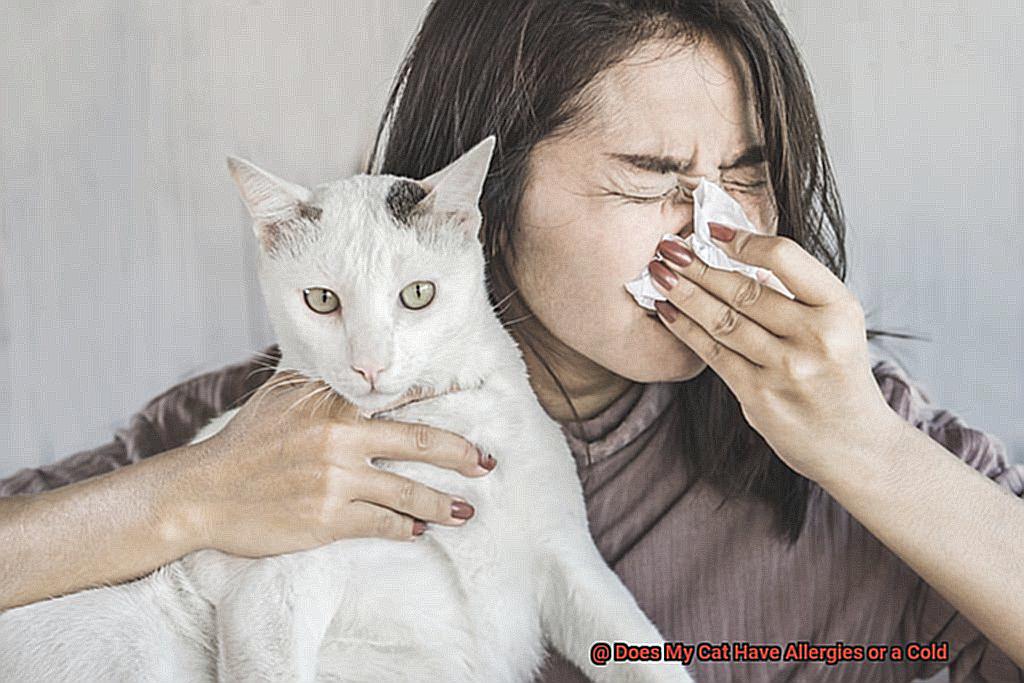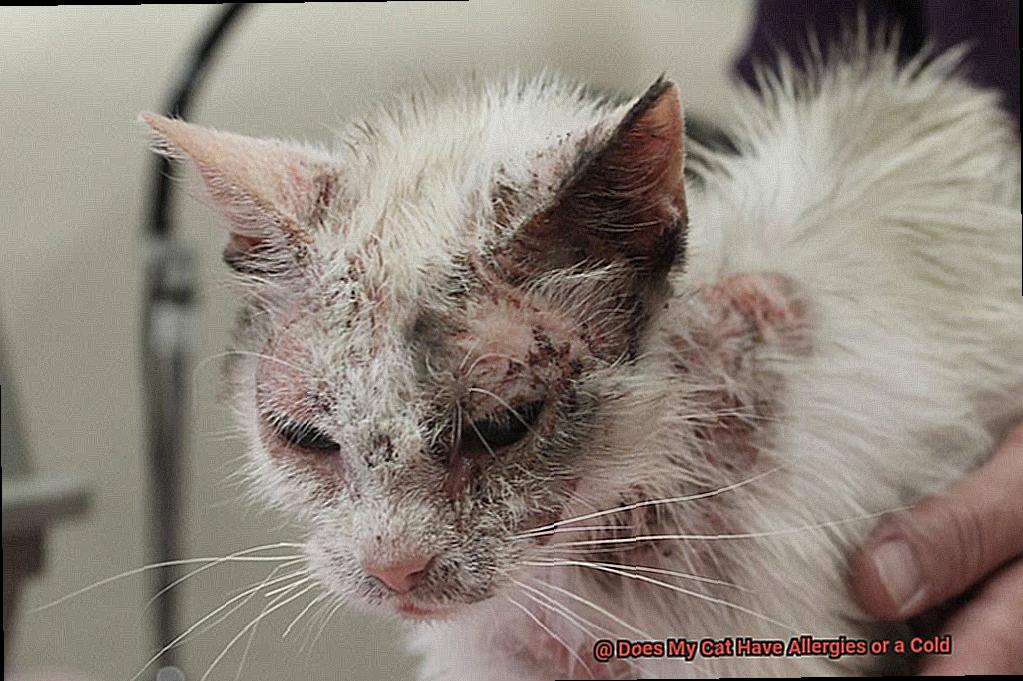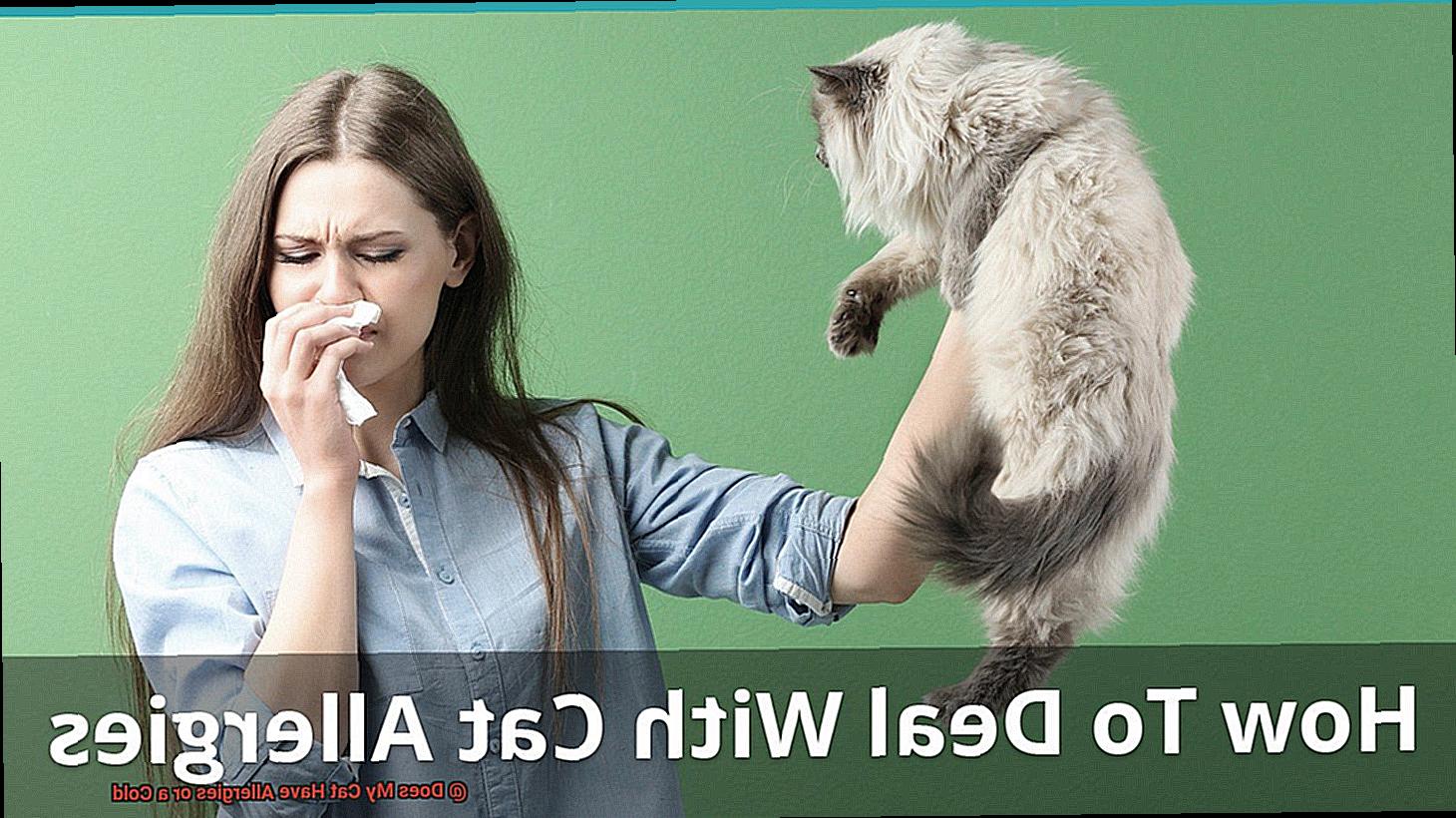Have you ever noticed your furry feline friend sneezing or coughing, and wondered if they have a cold or allergies? It’s a common dilemma among cat owners that can leave us feeling helpless. But fear not. Understanding the differences between a cold and allergies in cats can help you provide the proper treatment and ease their discomfort.
First things first, let’s talk about allergies. Yes, cats can indeed have them just like humans. Allergies occur when the immune system reacts to a specific allergen such as dust, pollen or certain foods by producing symptoms like sneezing, itchiness, and even gastrointestinal distress in some cases. On the other hand, cats can also get colds which are caused by viral infections affecting the respiratory system. Cold symptoms include sneezing, coughing, runny nose and fever.
In this blog post, we’ll delve into the key differences between allergies and colds in cats. We’ll discuss what causes them and explore some of the treatments that can alleviate their discomfort. Whether you’re a seasoned cat owner or new to the world of feline friends, this article is a must-read for anyone interested in keeping their cat healthy and happy. So sit back, relax with your furry friend by your side and let’s dive into this fascinating topic together.

Symptoms of Allergies in Cats
However, it can be tough to tell the difference between allergies and a cold in cats. While both conditions share some symptoms, such as sneezing and nasal discharge, allergies can cause more persistent symptoms that won’t go away on their own. So how can you tell if your cat is experiencing allergies?
One of the most common signs of allergies in cats is excessive scratching and skin irritation. Your furry companion may also have red and watery eyes, and they might be vomiting more than usual. These symptoms can occur at any time of the year, unlike colds that typically happen during the colder months.
If your cat has a history of allergic reactions or has recently been exposed to new environments or foods, this could also be an indication that they have allergies. Allergies are like unwelcome guests – they show up uninvited and make themselves at home. Additionally, gastrointestinal distress such as diarrhea and flatulence can be a sign that something is not right.
If you suspect your cat has allergies, don’t hesitate to seek veterinary care. Your veterinarian may recommend allergy testing or prescribe medications like antihistamines or steroids to help alleviate symptoms. They may also suggest dietary changes to manage your cat’s allergies.
Remember, allergies and colds can both cause discomfort for your cat, but they’re not necessarily dangerous. However, if your cat’s symptoms persist or worsen, it’s crucial to seek veterinary care as soon as possible.
In summary, keep an eye out for excessive scratching, skin irritation, red and watery eyes, nasal discharge, sneezing, and vomiting if you suspect your cat has allergies. Look for clues like a history of allergic reactions or exposure to new environments or food.
Causes of Cat Allergies
You may be suffering from cat allergies, but fear not. Understanding the causes of these pesky allergies can help you manage symptoms and continue to enjoy the company of your feline friend.
What causes cat allergies, you ask? Well, it’s the proteins found in a cat’s skin cells, urine, and saliva that can trigger an immune system overreaction in some people. When a cat grooms itself, these proteins are released into the environment and can stick to surfaces such as furniture, carpets, and clothing. Once a person comes into contact with these proteins, allergy symptoms may arise.
It’s worth noting that some individuals may be more susceptible to cat allergies due to genetics or previous exposure to allergens. Moreover, environmental factors such as cigarette smoke, pollution, or other allergens like pollen or dust mites can exacerbate cat allergies.

If you suspect that you have cat allergies, it’s important to identify the cause and take necessary precautions to manage symptoms. Visiting a healthcare provider or allergist for proper diagnosis and treatment options is highly recommended. In some cases, certain cat breeds may produce less of the allergen protein and be better suited for people with allergies.
In summary, don’t let cat allergies put a damper on your love for cats.
Symptoms of a Cold in Cats
Cats may have nine lives, but they’re not invincible to catching colds. Just like us, they can experience the sneezing, coughing, runny nose, and watery eyes associated with an upper respiratory infection. But did you know that your cat may also exhibit a loss of appetite, lethargy, and fever?
It’s important to note that while these symptoms are typical of a cold in cats, they can also indicate other conditions such as allergies or asthma. To ensure your feline friend gets the appropriate treatment, closely observe their behavior and seek veterinary care if their symptoms persist or worsen.
If your cat has a cold, you can make them feel more comfortable at home by providing a warm and quiet place to rest. It’s also crucial to ensure they have access to fresh water and food. Additionally, using a humidifier can help ease their breathing.
However, don’t wait too long before seeking veterinary care if your cat’s symptoms persist for more than ten days or if they show signs of severe illness such as difficulty breathing or lack of appetite. Antibiotics may be necessary to treat the infection.
Causes of Cat Colds
Just like humans, cats can fall ill due to various reasons, but the most common culprit is a viral infection. Feline herpesvirus and feline calicivirus are two common viruses that can cause upper respiratory infections in cats. These viruses are highly contagious and can spread easily from one cat to another.
Apart from viruses, bacterial infections such as Chlamydophila felis and Bordetella bronchiseptica can also cause cold-like symptoms in cats. These bacteria can cause sneezing, coughing, and a runny nose, just like a viral infection.
However, it’s not just infections that can make your furry friend feel under the weather. Environmental factors can also play a role. If your cat lives in a crowded or stressful environment, such as an animal shelter or multi-cat household, they are more likely to catch a cold. Stress weakens the immune system, making cats more vulnerable to infections.
It’s important to note that allergies can also cause symptoms similar to a cold. However, unlike a viral or bacterial infection, allergies are caused by an immune system response to a particular substance like pollen or dust. If you suspect that your cat has allergies rather than a cold, it’s important to seek veterinary care for proper diagnosis and treatment.
Preventing your cat from catching a cold is crucial, and there are steps you can take. Ensure their living space is clean and stress-free. Regular veterinary check-ups and vaccinations can also help protect your feline friend from viral and bacterial infections.
Understanding the causes of cat colds is vital for keeping your furry friend healthy. Prompt treatment can reduce symptoms and prevent complications. If you suspect any health issues with your cat, don’t hesitate to seek veterinary care right away.

Treating Cat Allergies at Home
Don’t fret. You can tackle cat allergies at home using simple yet effective steps.
The first thing you need to do is determine the allergen responsible for your cat’s symptoms. Common culprits include dust mites, pollen, and certain types of food. Once you figure out the source of the problem, you can start taking measures to reduce or eliminate exposure.

Keeping your home clean is crucial in this regard. Regular dusting, vacuuming, and washing of bedding and soft furnishings in hot water can help kill dust mites. Additionally, investing in an air purifier can filter out airborne allergens.
Another way to lessen exposure is by switching to a hypoallergenic cat food that’s gentle on sensitive stomachs. These special formulas can help alleviate allergy symptoms and keep your cat healthy.
Natural remedies are also an option for treating cat allergies at home. Giving your cat a bath with hypoallergenic shampoo can remove allergens from their fur, while saline nasal drops clear their sinuses and ease breathing. Supplements such as omega-3 fatty acids or probiotics can also boost their immune system.
However, it’s essential to remember that if your cat’s allergy symptoms persist or worsen, it’s best to consult a veterinarian. They may recommend prescription medications or allergy shots for lasting relief.
Treating cat allergies at home is achievable with some effort and care. By identifying the allergen, reducing exposure, and using natural remedies, you can help your beloved pet bounce back in no time.
Treating Cat Colds at Home
But worry not, treating cat colds at home is entirely possible with the right knowledge and resources. However, it is essential to note that if your cat is showing severe symptoms or isn’t responding to home treatments, you should take them to a veterinarian for further care.
The first step in treating a cat cold at home is to ensure that your cat is staying hydrated. This means providing fresh water and wet food to encourage them to eat and drink more. You can also turn on a humidifier in the room where your cat spends most of their time to ease their congestion and make breathing easier.
Another way to provide relief for your cat is by clearing out their nasal passages with saline drops or rinse. You can place a few drops of saline solution in each nostril, or use a bulb syringe to gently flush out their nasal passages.
If your cat is experiencing fever or discomfort, you can give them a small dose of acetaminophen or ibuprofen under the guidance of a veterinarian. It’s crucial not to administer any medication without consulting with a professional first.
Additionally, keeping your cat’s environment clean and free of irritants is crucial. Regularly cleaning their litter box, washing their bedding, and avoiding strong scents or chemicals in the home can significantly aid in their recovery.
Remember that cats are unique creatures, and some home remedies may not work for all cats. Always seek professional help if you are unsure about any treatment plan, as it’s better to be safe than sorry.
When to Seek Veterinary Care for Your Cat’s Allergies or Cold?
However, sometimes they can fall ill, and it can be tough to know when it’s time to seek veterinary care for their allergies or cold. To ensure the well-being of your cat, it’s important to be aware of the signs that indicate a visit to the vet is necessary.
While some mild symptoms can be treated at home with care and attention, more severe cases may require medical attention. If your cat is persistently sneezing, has nasal discharge, coughing, or difficulty breathing, it’s crucial to take them to the vet as soon as possible. These symptoms could indicate a more serious respiratory infection or disease that requires prompt treatment.
Think of it this way: if you were feeling unwell and your symptoms persisted for days, you would book an appointment with your doctor. The same should go for your feline friend.
In addition to respiratory issues, allergies can also cause discomfort and impact your cat’s quality of life. If you notice your cat excessively scratching, licking or biting themselves, it may be time to seek veterinary care. Your veterinarian can help determine the cause of their allergies and provide appropriate treatment options such as medication or allergy shots.
It’s worth noting that certain breeds of cats are more prone to respiratory issues than others. Himalayans and Persians, for example, may require more frequent veterinary check-ups to prevent and treat any potential problems.
Overall, it’s always best to err on the side of caution and seek veterinary care if you have any concerns about your cat’s health. Your vet can provide the necessary care and guidance to ensure your cat remains healthy and happy.
Prevention Tips for Keeping Your Cat Healthy
As a cat owner, you want to ensure that your furry friend stays healthy and happy. Here are five prevention tips to follow that can help reduce the risk of allergies or a cold and keep your cat healthy.
Keep their Living Space Clean
Just like us, cats can develop allergies from dust, dirt, and other allergens. To prevent this, it’s essential to keep their living space clean. Regular cleaning and vacuuming can remove any potential irritants that may cause allergies or respiratory problems for your cat.
Ensure a Healthy Diet
A healthy diet is vital for your cat’s overall health and well-being. Feeding your cat a balanced diet with plenty of vitamins and minerals can help boost their immune system and reduce the risk of them getting sick. Providing fresh water at all times is also crucial to keep them hydrated and healthy.
Regular Veterinary Check-Ups
Regular check-ups are essential to prevent health issues in cats. Your vet can examine your cat for any signs of illness or allergies and provide you with advice on how to keep your cat healthy. They may also recommend vaccines to protect against common cat illnesses such as feline herpesvirus, calicivirus, and feline panleukopenia.
Keep Your Cat Indoors
While outdoor spaces are great for cats to explore, keeping your cat indoors as much as possible can reduce their exposure to potential allergens and infectious diseases. Outdoor cats are more likely to come into contact with other cats and animals that may carry diseases or fleas, which can be easily transmitted to your pet.
Provide Mental Stimulation
Just like humans, cats need mental stimulation too. Interactive toys, scratching posts, and access to outdoor spaces (if safe and appropriate) can help keep your cat happy and healthy. Mental stimulation is also important for reducing stress in cats, which can lead to health issues.
By following these prevention tips, you can help keep your cat healthy and minimize the risk of them developing allergies or a cold. However, if you notice any signs of illness or allergies in your cat, it’s crucial to consult your veterinarian immediately for proper diagnosis and treatment.
I_JIMaUI4vI” >
Conclusion
In summary, it is important to differentiate between allergies and colds in cats to provide appropriate treatment and alleviate their discomfort. Allergies are caused by the immune system’s reaction to a specific allergen, while colds result from viral infections affecting the respiratory system.
Signs of allergies include excessive scratching, skin irritation, red and watery eyes, and vomiting. On the other hand, symptoms of a cold include sneezing, coughing, runny nose, lethargy, and fever. Identifying the cause of cat allergies is crucial in managing symptoms. Proteins found in a cat’s skin cells, urine, and saliva can trigger an overreaction in some people’s immune systems.
To reduce exposure to allergens, regular cleaning of living spaces is recommended. Hypoallergenic cat food can also alleviate allergy symptoms. Home remedies such as saline nasal drops or rinses can ease cold symptoms. Keeping your cat hydrated is also essential.
If your cat’s symptoms persist or worsen after ten days or show signs of severe illness such as difficulty breathing or lack of appetite, seek veterinary care immediately. Regular veterinary check-ups, keeping living spaces clean, feeding a healthy diet with fresh water at all times and providing mental stimulation can help prevent allergies or a cold from developing.







